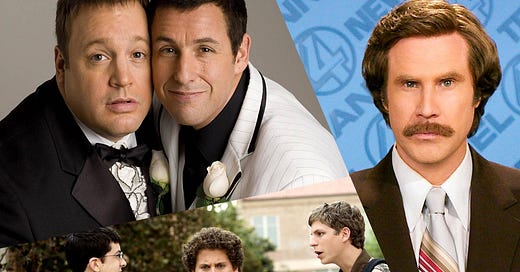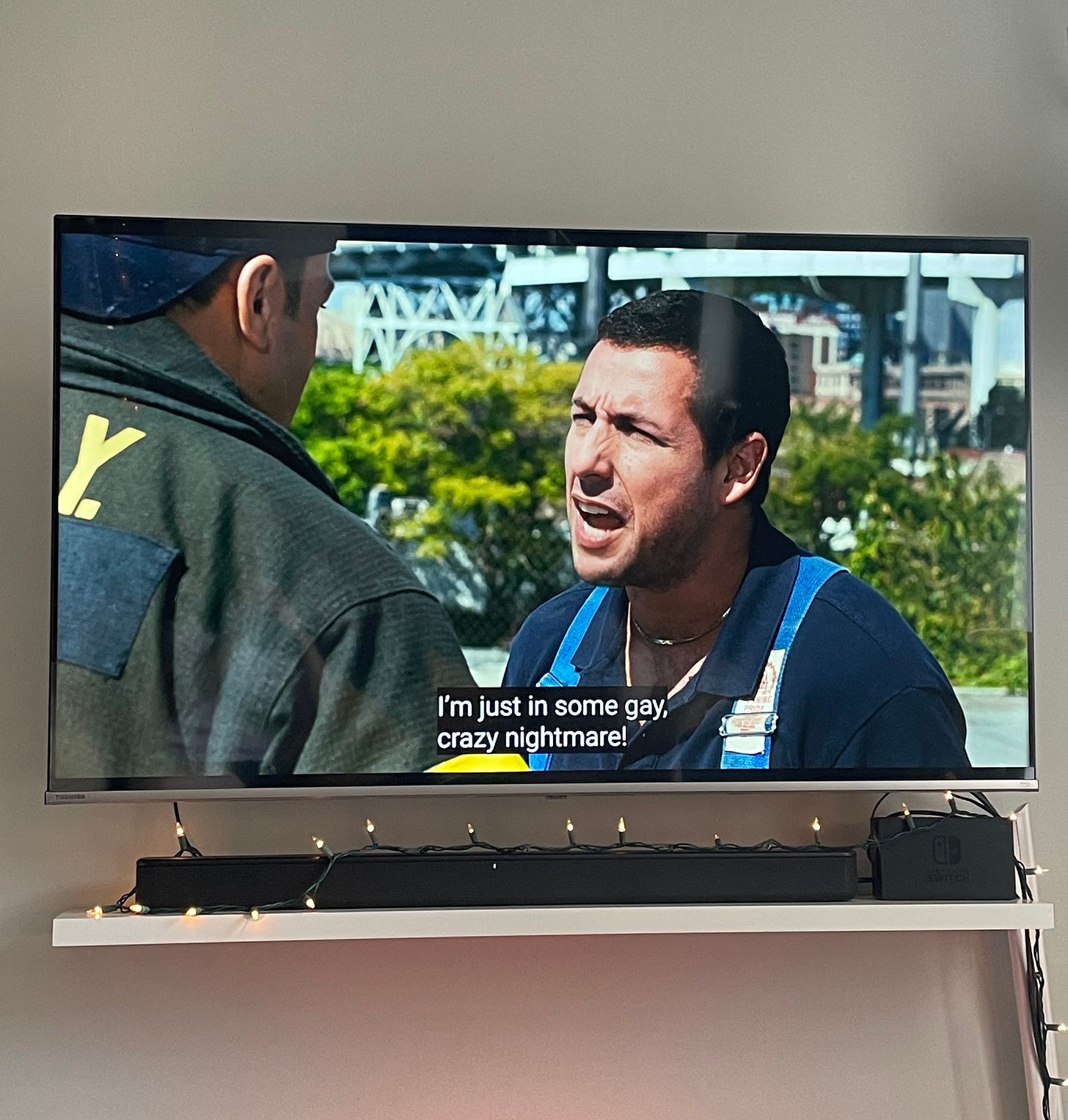You’re reading Boy Movies, a weekly newsletter. Today’s issue, requested by my friend Kerry when I put out a call for suggestions back in June (yes, I’m still making my way through those, don’t worry!!!), looks back at an iconic era in the boy movie canon: the bro comedies that defined the 2000s.
Ringing the media pickup alarm
Unbelievably, Boy Movies was mentioned in a NEW YORK TIMES piece on Sunday! A million thank yous to iconic cookbook author, reader, and beloved Twitter mutual Abi Balingit, who was kind enough to cite my silly little operation in this story about what it means to be an incredibly online girlie. What an honor!!!
Paging Doctor [REDACTED]
If you haven’t seen No Hard Feelings, this summer’s Jennifer Lawrence-starring salute to the sex comedies of yore, you’ve likely at least heard about the naked beach fight scene. The scene in question, in which a nude Lawrence storms out of the ocean — bush first, boobs swinging — to brawl with a group of teens trying to steal her clothes, is the type of audaciously goofy moment that we rarely get in movies anymore: nudity, devoid of any sexual connotation and played for a big laugh. I liked No Hard Feelings, a solidly three-and-a-half-star movie, but I really liked the way it brought me back to a time I’ve recently been feeling nostalgic for: the 2000s boy comedy boom.
You know what I’m talking about. This was the era that dared to dream about a world where “average-looking” white guys like Will Ferrell and Seth Rogen and Steve Carell1 could be stars. This was the era in which one single blank slate of a woman wearing low-rise jeans could prove she was different from all those other dumb sluts. This was the era of “I love lamp.” If you’re anywhere near me in age, your sense of humor might have developed during this era, too. I’ve spent years denying this fundamental truth about myself, but in life’s rich tapestry, the path to inner peace is forged by acknowledging one’s own secret shames and little embarrassments. I’m still working on this, but at least I’ve learned to accept that I still think Anchorman is pretty funny.
This all started back in August, when my friends and I were on vacation and found ourselves seated for the entirety of 2008’s Forgetting Sarah Marshall when it came on hotel cable. We also caught parts of, yes, 2004’s Anchorman. Revisiting these sent me down a path, inspiring my first rewatch of 2009’s The Hangover in over a decade. Then I burned through 2005’s Wedding Crashers, 2007’s I Now Pronounce You Chuck & Larry, and 2005’s The 40-Year-Old Virgin, one right after the other. So on and so forth.
With a truly carefree combination of unrelentingly boisterous spirits and similar rhythms, it’s not an exaggeration to say that these movies created their own canon. Some are about pathetic men going through unwelcome life changes (Forgetting Sarah Marshall, Step Brothers), some are about groups of friends grappling peripherally with the passage of time (Superbad, The Hangover). Some are about nonsense competitions that will give a pathetic man the chance to prove himself (Dodgeball, Hot Rod). Many are based around some sort of elaborate fabrication (Wedding Crashers, I Now Pronounce You Chuck & Larry). They are treasure troves of racist, homophobic, and misogynistic jokes. The hijinks, of which there are many, are calamitously over-the-top. Broad physical comedy is a guarantee. There is always at least one raunchy sex scene in which a woman humiliates herself. Villains range from hot idiots dating the girl the main guy wants, to bitchy girlfriends who must be disposed of in favor of a less bitchy girl. Most end with the guy getting the low-rise jeans girl2. There are no lasting consequences or any real lessons to be learned in these films, which are tied together by their fascination with the same concept: Male friendship is one of this universe’s driving forces, and it must be protected at all costs.
The boy comedies of the 2000s aren’t without layers. There are different flavors, even if they all generally hold the same principles. A Judd Apatow comedy is different from an Adam Sandler comedy is different from a Lonely Island comedy: An undercurrent of sadness reliably runs through an Apatow narrative, while a Sandler-led story favors toilet humor, and the Lonely Island guys mine their jokes out of a total separation from reality. All exist within the same continuum, and yet no two are exactly the same. Intriguingly, these narratives are about the performance of masculinity (everyone is so afraid of being called gay), but not necessarily machismo. Here, testosterone-fueled meatheads are the enemy; this era celebrated the underdog. There’s also a fascinating joke progression that happens as the years go on and the presidents change3, as comedy undergoes a shift from wacky non-sequiturs like “No, Kelly Clarkson!” into the “random comment” followed by a “Well, THAT happened” format. (Ed Helms’ character Stu in The Hangover — who, and due respect to Helms, I wish someone had murdered — is a huge proponent of this.) Most, it should be said, did great at the box office. In every sense, it was a different time.
What defines these movies, as I said, is the emphasis placed on the platonic relationships between men. There is always a low-rise jeans girl to be chased, but she’ll never be one of the guys — and nothing is more important than the guys. What wakes these male protagonists up in the morning are their unbreakable bonds with other men. The pursuit of a low-rise jeans girl can even be a group effort, with sex acting as a key component of any 2000s male-driven comedy: The 40-Year-Old Virgin is built on the idea that one awkward guy’s buddies could My Fair Lady him into getting laid for the first time, while Wedding Crashers is about two friends who derive mutual joy out of lying to the women they sleep with. In the 2000s, the epic highs and lows of male friendship were explored from every possible angle. In the 2000s, a straight man could literally marry another straight man and it wasn’t even actually gay4.
These are dudes rock films, certainly, but the whole conceit goes even deeper than dudes rocking. It’s not just that dudes rocked in the 2000s, it’s that dudes were the 2000s. Dudes were the funniest, most profound beings on the planet. Dudes were all anyone knew. Watching a 2000s boy comedy is sort of like getting a glimpse at a version of society where women’s brains, collectively, hadn’t fully developed. I don’t mean to sound reductive, and I do recognize that a small handful of the female characters in these films aren’t entirely one-note, but it’s still no wonder people were so shocked when Bridesmaids was released in 2011. Remember that review quoted on all the posters that said “CHICK FLICKS DON’T HAVE TO SUCK”? That is the mentality of a people who had just barely clawed their way out of a full decade of bro comedies. We all sat down for Bridesmaids with “It’s not a man purse, it’s called a satchel” still echoing in the recesses of our brains; a bit of forgiveness is probably due.
Male friendship hasn’t gone out of fashion, so why has the male-driven comedy? We saw the last few gasps of the boom in the early 2010s, with Get Him to the Greek (itself a spinoff of Forgetting Sarah Marshall) and 21 Jump Street, but the phenomenon fizzled as superheroes took over and IP began to dominate. Sequels to Anchorman and Zoolander attempted to capitalize on the magic of their predecessors, but their times had passed. Maybe culture has changed too much; maybe we’ve all become too jaded for such bold celebrations of bro-dom. You couldn’t, wouldn’t, and shouldn’t make Wedding Crashers today, but I don’t know that the genre it exists within should be entirely lost to the sands of time. There’s something there, an uncomplicated ease that I miss and would eagerly buy a ticket to again if given the opportunity. If No Hard Feelings made a solid case for a return to the mid-budget comedy, why not let Maestro tell a damn dick joke again and see what happens?
I Now Pronounce You Chuck & Larry is Adam Sandler’s Passages: A Study
The best in the biz, Cody Corrall and Ally Taylor, had me back on their seminal Twilight podcast Into the Twilight to discuss certified boy movie The King. If you’ve ever wanted to hear me talk about being a Chalamaniac and read an excerpt of an iconic work of Succession fanfiction, now’s your chance. I love these two and I love this podcast!
Bradley Cooper is galactically hot in The Hangover. I just needed to say that somewhere because like, wow, you really do forget sometimes that Maestro is sexy.
Obviously all of these men are handsome but you know what I mean.
Low-rise jeans girls don’t always have to wear low-rise jeans to qualify — it’s more of a state of mind. Christina Applegate in Anchorman, for example, is a low-rise jeans girl, despite never wearing a pair of low-rise jeans.
I’m speaking from an American perspective; the 2000s British comedies, like Hot Fuzz and Shaun of the Dead, are an entirely different animal I won’t be touching on in this issue.
No one wants to hear me say this but I Now Pronounce You Chuck & Larry is a rich text. AMA.








i watched i now pronounce you chuck and larry for the first time this year and unfortunately it did make me shed real tears so i agree that it’s a rich text
Know that for me getting a shout out in BM is equivalent to a NYT mention :)